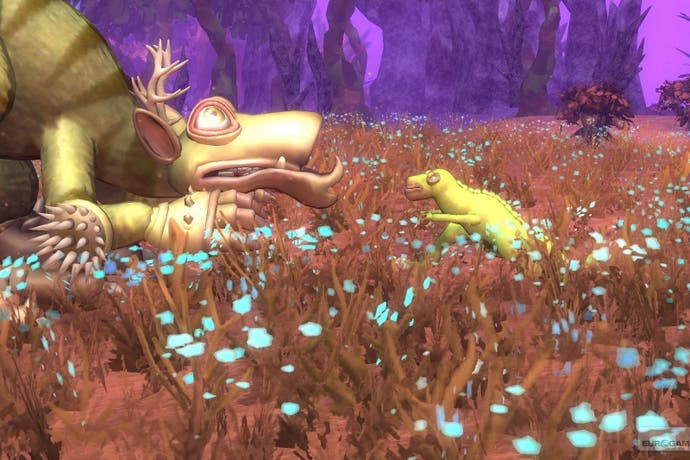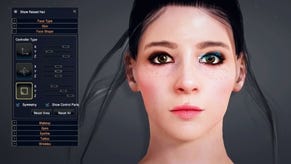Looking back at Spore in a post-No Man's Sky world
Deep simplicity.
In the weeks leading up to No Man's Sky's release, when the hype train was speeding heedlessly toward the collapsed bridge of reality, the gaming community's collective neuroses coalesced beneath the ragged banner of another game - Spore. "Will No Man's Sky end up being the next Spore?" fretted Forbes, while Quora quavered "Will No Man's Sky become another Spore?"
It wasn't just the latest batch of hot-takers who wound themselves into a tizzy either. NeoGaf needled that "No Man's Sky could end up being the "Spore" of this generation", while suspicious Steam forumites asked "Anyone skeptical of this game because of Spore?" Heck, even the developers of No Man's Sky addressed the comparisons to Spore way back in the prehistoric era of 2014. "I actually liked it, and enjoyed it" said Sean Murray during an interview with Game Informer, "But I was kind of one of the few people. I know that I was."
Poor Spore! The way people speak of it nowadays, you'd think it was a rogue copy of Duke Nukem Forever that had gone around the houses bludgeoning everyone's nanna. The slightest mention of Will Wright's white elephant seems to make the Internet angrier than a thousand Mass Effect 3 endings. I find this a little tragic, because there are few games in existence with better intentions than Spore. Whatever else you may think of it, there's no denying that it made a genuine effort to find the joy in Life, where so many others only derive pleasure from death.
What's peculiar about this is if you look back to Spore's initial release in 2008, it reviewed really well. I mean really well. Eurogamer's Tom Bramwell gave it a 9, stating "the final game is proof that it was all worth it". PC Gamer awarded it 91, Game Informer 88. The game's critical metacritic average is 84. The user average is admittedly 5.2 based on a few hundred reviews. But over on Steam, Spore emerges from over 8,000 users review with a "Very Positive" rating.
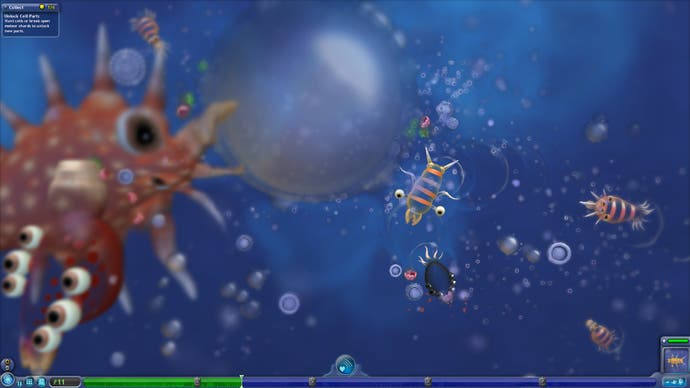
The only thing certain in all this is that Spore's legacy is a mess, a primordial ooze of reverence and revulsion that no other game, not Far Cry 2, not Black and White, has trailing behind it like a ribbon of toilet paper stuck to its shoe. This isn't because Spore is either a great game or a dreadful one, although I think there are instances where it is both. It's because Spore promised us the Moon, and several years later, returned with some big boring rock.
As we all know now, Will Wright's idea was to turn life into a game, a feat he'd already achieved to great effect in The Sims. Only this time around, he meant it with a capital L. Spore would take the player on a journey from controlling a single-celled organism to exploring the entire cosmos as an intelligent, interstellar race of beings. Even in concept it is both a wonderful and terrible idea, bold and awe-inspiring, but also vaguer than a TV psychic. It's the sort of thing a bad novelist would say when asked what his book was about. "Life, love, and creatures with seventeen arms."
It's obvious that such an idea needs to be both broken down and watered down, and it's in how Spore approaches both where the Moon reveals itself to be a big boring rock. One of the most famous criticisms of Spore is that it is five mini-games rather than one cohesive whole. This is both untrue (the space stage couldn't be less of a minigame) and not the problem. Rather, the issue lies in how those separate stages slowly peel back the illusion and reveal the fundamental flaw at the heart of Spore.
As Wright promised, we begin Spore as a single-celled organism floating in the deep dark ocean of a procedurally generated planet. In what resembles an open-world version of Pac-Man, you swim around eating either tufts of algae or other cells, gradually growing in size and adding extra body parts to your little lifeform. Even today, the cell-stage is my favourite part of Spore. It's the one area of the game where its tendency toward simplistic interaction works. It doesn't outstay its welcome, and watching your cell's rapid growth and gradual ascent toward the surface of the ocean, where ever-larger creatures lurk in the background, is gently satisfying.
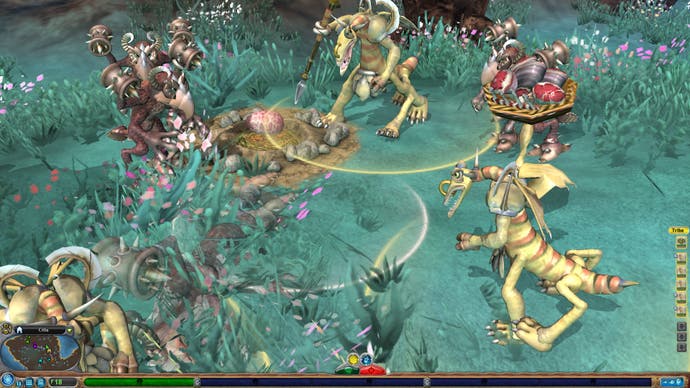
At the end of the cell stage, your creature evolves legs and the game transitions to a 3D, third person perspective, while the objective switches from growing a larger body to evolving a larger brain. Yet while your creature changes greatly during this stage, mechanically the game only shuffles forward a couple of epochs. To fuel your evolution, you can choose either to fight other creatures or impress them through mimicry. The former is elementary and the latter downright insipid. But the Creature stage remains enjoyable for two reasons. The first is the straightforward joy of tinkering with your creature's look through the excellent character designer, and the second is the weirdness of exploring the world through the creature's perspective, avoiding giant monsters and devastating meteor showers, and gazing up in bewildered awe as a spaceship rocks up and starts sucking up animals like a big sky hoover.
It's in the next two phases, Tribal and Civilisation, where Spore really lets itself down, as the concept races away into a facsimile of human history while the systems fail to keep up, presenting us with a pair of RTS games that would have been considered basic in the days of Command and Conquer. What's more, the only notable difference between the two is the Civilisation stage also overwhelms the player with half a dozen types of object to create, turning what is arguably the game's strongest asset into an incessant chore.
It's also at this point where the evidence for the "kids" criticism begins to mount . Around the time of release, a suspicion developed that Spore's saccharine aesthetic was part of a decision to target the game toward children, and that this was also the root of the game's simple interactions. Even if we assume this to be true, the problem is not that Maxis made the game child-friendly, it's that they assumed kids are stupid and need to be patronised. You only need to look at the runaway success of Minecraft, a game that until very recently didn't have a tutorial, to understand that this isn't the case at all. If Maxis did dumb Spore down, such an effort was rendered pointless by the final twist in Spore's tale, your race's arrival at the space age. Suddenly, the game opens up like a flower in sunlight, transforming into the truly massive game of exploration, trading, diplomacy and combat. It's as if, unfettered by the realities of evolution and human history, Maxis' imagination takes flight. There's an enormous amount to do in the space stage and among all the familiar activities you'd expect from a space sim are entirely original ideas like seeding colonies, terraforming planets and unravelling the mystery of the elusive Grox. It's disarmingly good.
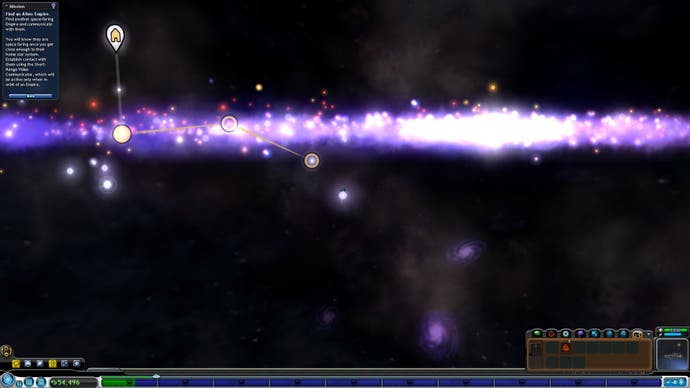
The problem with this, of course, is that it's not ultimately what Spore was supposed to be about. The space stage is effectively Spore's endgame, the point at which your species has ceased to evolve. But in practical terms is when Spore actually gets going. Moreover, even here there's an almost stubborn attempt by Maxis to simplify, to ensure the spaceship can be controlled with just the mouse while a plethora of icons spill out across the screen like a burst of pollen from a plant.
I think, in the end, that's where Spore really falls down. The issue isn't so much with any particular stage, it's this baffling attempt to funnel arguably the most ambitious game ever made through a control scheme that boils down to a single button. Amidst all its ideas, Spore forgets how important the connection is between the player and the game world, and how much the wiring of that connection can affect the player's experience. Imagine if games like Elite, or Forza, or Far Cry, were all controlled through one button. It's like looking at the ceiling of the Sistine chapel through a pinhole, or listening to someone play Thus Spake Zarathustra on a kazoo.
The result is, by the time the player reaches the incredible space stage, it's too late. The game has been signed, stamped and filed away in the player's mind as overly simplistic, and an entire galaxy at their fingertips can't undo that assertion. In its final act, Spore really does take us to the moon, but by that point we've been programmed by the rest of the game to view it as a big boring rock.
Nevertheless, I can't bring myself to hate Spore in the way some people do. I just can't. And it isn't merely those good intentions. I think the cell stage is a good little game, and the space stage is a great big game. If Spore had cut out the whole evolution concept and marketed itself a straightforward space sim, I reckon we'd look upon it a lot more fondly.
As a matter of fact, while the world worries that No Man's Sky is another Spore, I find myself disappointed that No Man's Sky isn't a little more like Spore. Imagine if No Man's Sky let you interact with other species in the way Spore does, trading with them, politicking with them, doing missions for them. Imagine if it let you terraform planets with giant atmosphere generators, before colonising them in the name of your own race. Imagine if its universe was one that visibly moved and whirred and ticked and changed, rather than simply sitting there waiting to be discovered like an artefact in an Indiana Jones movie.
Spore may not be the game we hoped it would be, but it isn't the smoking wreck it's been retrospectively labelled as either. I think both modern space sims and procedurally-minded games can still learn a lot from it, and not just by poring over its mistakes.
